United Against China?
Japan invests in India, and the two countries prepare for potential hostility from China.
Japan invests in India, and the two countries prepare for potential hostility from China.
A "stealth war" between the second and third largest economies sparks fear amongst international businesses and leaders.
China said Prime Minister Shinzo Abe was evading Japan’s “history of aggression” by comparing Sino-Japanese relations to those of the U.K. and Germany prior to World War I.
Some observors say the decline may be due to a reluctance to involve the U.S. in Sino-Japanese disputes.
Escalating disputes between Japan and China are spilling onto newspaper opinion pages around the globe as the rivals try to sway attitudes abroad and placate nationalist fervor at home.
Japan must reckon with England as an eventual addition to the enormous political strength of China and Russia.
Despite heavy investments in technology, aerospace, and autombiles, most Chinese trade is still in low-end goods.
Political-risk expert Ian Bremmer of the Eurasia Group calls the bilateral conflict between China and Japan the "greatest geopolitical danger in the world in 2014" and discusses what reform means for China under new leader Xi Jinping.
Ill-tempered media exchanges between the Chinese and Japanese ambassadors to London invoked the universal cultural icon to embellish attacks over islands in the Asia-Pacific.
A Chinese balloonist took off from the coastal province of Fujian, trying to land on an island claimed by both China and Japan. Unfortunately, the balloonist, a cook by profession, didn’t make his target.
Beijing has declared Japanese Prime Minister Shinzo Abe “not welcome” by the Chinese people and said Chinese leaders won’t meet him.
Prime Minister Shinzo Abe of ...
Japan will increase military spending by 2.6 percent over five years, leading China to accuse Tokyo of raising tensions.
Japan and the Philippines have reaffirmed their commitment to freedom of flight over the East China Sea as concerns grow over China's new air...
The navies of Japan and South Korea, two Asian democracies, carried out a joint maritime rescue drill in international waters covered by China's new air defence identification zone (ADIZ).
Joe Biden’s trip to northeast Asia has left some in Japan feeling abandoned. By not demanding that China roll back its new “air-defense identification zone,” the U.S. vice president tacitly accepted the controversial zone as a fait accompli.
Japanese Prime Minister Shinzo Abe called for a summit with Chinese President Xi Jinping after an escalation in bilateral tensions since China’s declaration last month of an air-defense zone that overlaps with Japan’s over the East China Sea.
China’s recent declaration of an Air Defense Identification Zone (ADIZ) in the East China Sea has stimulated much debate and concern and interpretations have varied widely. The Chinese government has asserted that the ADIZ is in accordance with...

Chen Weihua:
The Air Defense Identification Zone (ADIZ) is not a Chinese invention. The United States, Japan and some 20 other countries declared such...
Authorities barred a planned protest to the Japan-controlled Senkaku Islands in the East China Sea last month involving activists from both the mainland and Taiwan, but the protesters are now eyeing another try next month, one of the...
Chinese Foreign Ministry spokeswoman Hua Chunying responded to a media report that the Japanese Foreign Ministry have released a video online claiming sovereignty over the Diaoyu Islands.

For decades, a major piece of World War II history has gone virtually unwritten. The war began in China, two years before Hitler invaded Poland, and China eventually became the fourth great ally, partner to the United States, the Soviet Union, and Great Britain. Yet its drama of invasion, resistance, slaughter, and political intrigue remains little known in the West.
While the media keeps its eye on the ongoing Diaoyu/Senkaku islands dispute, heating up yet again this week after Chinese naval ships...
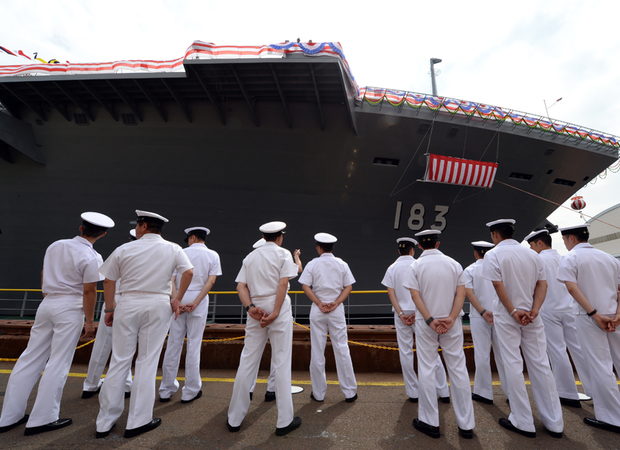
Paula S. Harrell:
While the media keeps its eye on the ongoing Diaoyu/Senkaku islands dispute, heating up yet again...
Due to a variety of factors, the amount of Japanese people who dislike China and the amount of Chinese people who dislike Japan are on the rise, while those with positive feelings about the other country descends, according to recent polls.
Japan and China have not held high-level meetings since the Japanese government placed the Senkaku Islands in the East China Sea under national ownership in September 2012.
China said on Thursday it had lodged a formal complaint with the United States after the U.S. Senate passed a resolution expressing concern about Chinese actions in the disputed East and South China Seas.

Sino-Japanese relations do not look promising at the moment. Obviously, the Diaoyu-Senkaku dispute is not the only factor in play but it does focus nationalist passions on both sides. Yet both countries are capable of wiser conduct if their...
“Japan, of course, wants to have it both ways; it wants to share in the dividends from China’s economic growth, while maintaining a hardline stance in its relations with China,” Xing wrote. “It is therefore extremely unlikely that there will be...
The large number of Chinese and Japanese maritime vessels in dangerous proximity in the East China Sea at a time of high tensions over the islands has raised alarm in Washington about clashes that could lead to larger conflict.
The Chinese government has not asserted a claim to Okinawa. But the seminar last month, which included state researchers and retired officers from the senior ranks of the People’s Liberation Army, was the latest act in what seems to be a...
On the surface, the dispute is about history, about which country has the best claim to sovereignty over the Senkaku/Diaoyu. It is more about politics, domestic and international, revealing the tangled relations in a region where history is...
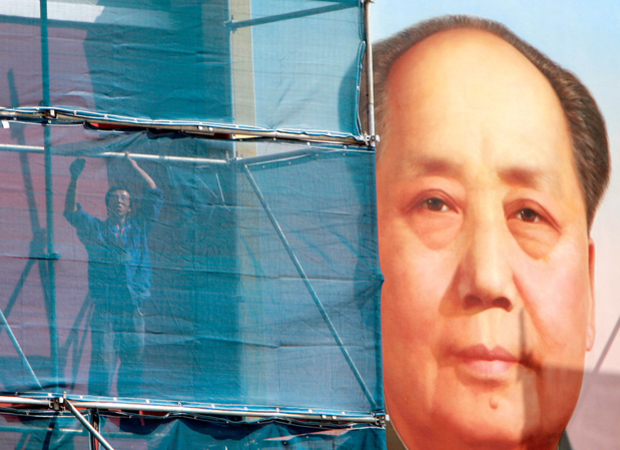
Ma Licheng (马立诚) is a former Senior Editorials Editor at People’s Daily, the Communist Party’s most important mouthpiece, and the author of eleven books. In 2003, when...
The United States, as a treaty ally of Japan but with vital strategic interests in fostering peaceful relations with China, has a major stake in averting a clash between the two forces and resolving the dispute, if possible....
Japan and China faced off anew over a group of disputed islands after visits to a controversial war shrine by Japanese politicians rankled Tokyo’s neighbors, raising concerns that tensions may be returning after a period of relative calm....
Hu, who has been described as the most dangerous woman in China because of her investigative reporting, gives an interview about the challenges facing new president Xi Jinping in 2013.
The world’s second and third largest economies are engaged in a standoff over the sovereignty of five islets and three rocks in the East China Sea, known as the Diaoyu in Chinese and the Senkaku in Japanese. Tensions erupted in September 2012...
Xi Jinping’s first foreign visits since his inauguration and new appointments in foreign policy-related positions hint at the direction of the new administration’s foreign policy plans and goals.
Well-known U.S. newspapers including the Wall Street Journal and the Washington Post have raised the eyebrows of many Chinese recently in their two questionable reports on sensitive China-related topics.
Within two decades the United States will be forced out of the western Pacific, says a senior Chinese military officer, amid concerns that increasingly militarised great-power rivalry could lead to war.
Global economists are keeping their eyes glued to the Asia-Pacific region, where a bitter feud is brewing between two of the world’s most powerful nations over a small collectivity of islands in the East China Sea. The Chinese government argues...
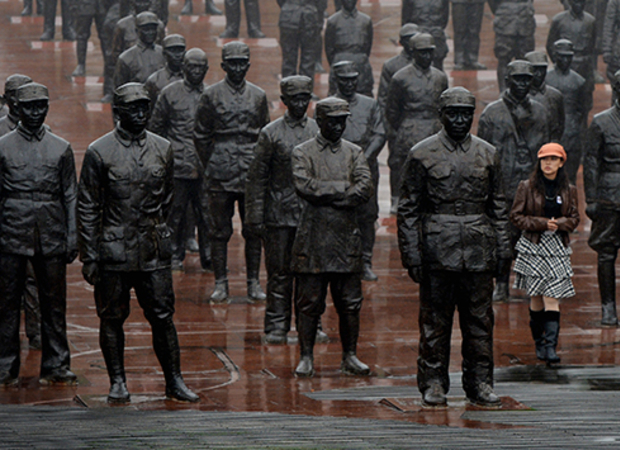
Are Chinese audiences growing weary of anti-Japanese propaganda? It would seem that some, at least, are growing sick of the pathetic villains, superhuman heroes, and lame endings that many Chinese movies and television series about World War II,...

The rise and influence of public opinion on Chinese foreign policy reveals a remarkable evolution in authoritarian responses to social turmoil. James Reilly shows how Chinese leaders have responded to popular demands for political participation with a sophisticated strategy of tolerance, responsiveness, persuasion, and repression—a successful approach that helps explain how and why the Communist Party continues to rule China.
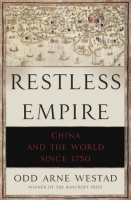
As the twenty-first century dawns, China stands at a crossroads. The largest and most populous country on earth and currently the world’s second biggest economy, China has recently reclaimed its historic place at the center of global affairs after decades of internal chaos and disastrous foreign relations. But even as China tentatively reengages with the outside world, the contradictions of its development risks pushing it back into an era of insularity and instability—a regression that, as China’s recent history shows, would have serious implications for all other nations.
Over the past few days, angry crowds in more than thirty Chinese cities have trashed Japanese stores, overturned Japanese cars, shouted “Down with Japan,” and carried banners that demand Chinese sovereignty over the uninhabited Diaoyu Islands in...
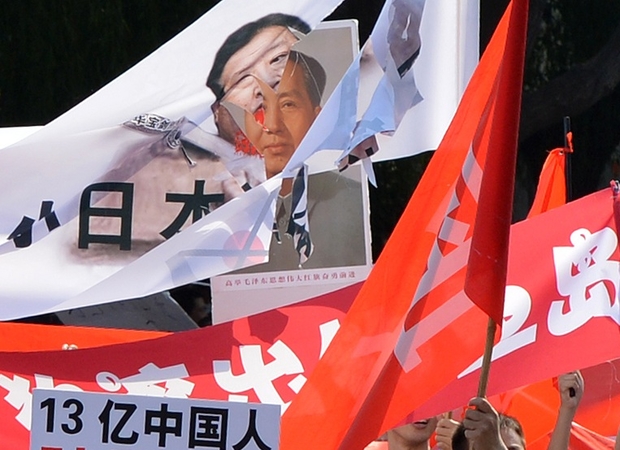
On the afternoon of September 16, rows of policemen and security personnel in black T-shirts lined Beijing’s Liangmaqiao Road near the Japanese embassy during protests over the Diaoyu Islands controversy. Security guards were visible everywhere,...
There was another side to the anti-Japanese demonstrations that rocked Chinese cities this weekend, reacting to Japanese activists who had landed on a disputed island chain in the East China Sea. As Chinese protesters asserted their national...
Popular Chinese websites on Monday ran photos from anti-Japan protests across the nation, showing images of flipped-over and smashed Japanese-model cars in apparent reaction to a China-Japan dispute over a clutch of rocky islands.
But in a...
Anti-Japanese protests spread across China over the weekend, and the landing of Japanese activists on a disputed island on Sunday sharply intensified tensions between the two countries.
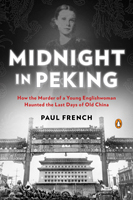
January, 1937: Peking is a heady mix of privilege and scandal, lavish cocktail bars and opium dens, warlords and corruption, rumors and superstition—and the clock is ticking down on all of it. In the exclusive Legation Quarter, the foreign residents wait nervously for the axe to fall. Japanese troops have already occupied Manchuria and are poised to advance south. Word has it that Chiang Kai-shek and his shaky government, long since fled to Nanking, are ready to cut a deal with Tokyo and leave Peking to its fate.
Those who think that the Japanese are a little odd will have been confirmed in their prejudice by the behavior of Prime Minister Koizumi Junichiro during his June visit to the United States. The social highlight was a trip to...